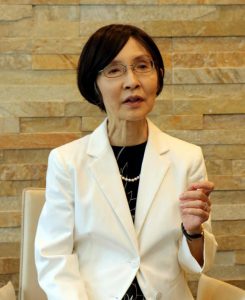To Nihon Hidankyo upon receiving Nobel Peace Prize: Fumiko Nishizaki, Professor Emeritus at University of Tokyo, says they held fast to belief that nuclear weapons are absolute evil
Nov. 10, 2024
Politicians today have fallen into a rut in their thinking
by Fumiyasu Miyano, Staff Writer
The Japan Confederation of A-and H-Bombs Sufferers Organizations (Nihon Hidankyo) was nominated by the International Peace Bureau (IPB) for the Nobel Peace Prize in 1985. Subsequently, nuclear-related organizations that received the prize included the International Physicians for the Prevention of Nuclear War (IPPNW) and the International Campaign to Abolish Nuclear Weapons (ICAN).
I have always wondered why Hidankyo was not chosen to receive the prize. Its members have experienced the impact of nuclear weapons firsthand and have overcome their suffering to take the lead in spreading the idea of the abolition of nuclear weapons to the world. I wish they could have received the award sooner. I wanted to see the happy faces of those who have worked so hard since Nihon Hidankyo’s founding. Still, I am happy. As the number of atomic bomb survivors decreases, this recognition will be a great encouragement.
Jorgen Watne Frydnes, Chair of the Nobel Committee in Norway that chose the award recipient, is 39 years old. Like him, young people from Northern Europe understand the importance of the A-bomb survivors’ movement. This generational and geographical diversity shows the success of the movement.
When Ms. Nishizaki was a student, she was invited by Terumi Tanaka, 92, current co-chair of Nihon Hidankyo and an acquaintance of her father, to help with its activities. She served as an interpreter at the second United Nations Special Session on Disarmament in 1982 and during a European campaign where she met with Pope John Paul II.
A-bomb survivors, who debated repeatedly and honed their reasoning, were radiant with life. Despite the reality that things did not go as they wanted, they held fast to the unwavering belief that nuclear weapons are absolute evil. They never act half-heartedly. It was a privilege to share rooms and meals with them and serve as an interpreter. A-bomb survivors have deeply influenced my way of life and my way of thinking, and their conviction that nuclear weapons are absolute evil has become my own.
In addition to calling for the abolition of nuclear weapons, Nihon Hidankyo is advocating for national compensation for the damage caused by the A-bombing.
A-bomb survivors have not only spoke about their experiences of the A-bombing but have also rejected a doctrine of perseverance that all citizens must equally accept and endure the damage caused by the war. They argue failing to question the country’s responsibility for the war is tantamount to affirming it, and that only by compensating for the damage caused by the A-bombing can the country genuinely pledge never to create more A-bomb victims. They have persistently engaged in deep discussions and put forth strong arguments.
The Japanese government advocates for the abolition of nuclear weapons but continues to rely on the United States’ nuclear umbrella.
Japan’s current political leaders belong to post-war generation and are insensitive to the experiences of the A-bombings. Preoccupied with the severe security environment, they have fallen into a rut in their thinking and lack the imagination needed to fully grasp the horror of nuclear devastation. If they become prime minister or a cabinet member, I would like them to visit the Hiroshima Peace Memorial Museum and the Nagasaki Atomic Bomb Museum.
It is also important to consider why efforts to abolish nuclear weapons have failed. The issue is not that A-bomb survivors lacked effort, but rather that people around them continue to support reliance on nuclear deterrence without heeding the survivors’ appeals. The recognition of the horrors of nuclear weapons is not linked to nuclear policy.
We can find wisdom to bridge this divide in the history of A-bomb survivors’ movement. The activities of the NPO “No More Hibakusha Project” in collecting records of their movement is significant. I hope this Nobel Peace Prize will serve as an opportunity to gather support.
Fumiko Nishizaki
Born in the city of Sendai, Ms. Nishizaki completed a doctoral program at Yale University Graduate School in the United States. Served as an interpreter for the Japan Confederation of A-and H-Bombs Sufferers Organizations (Nihon Hidankyo) in the 1980s and 1990s. After serving as professor at Seikei University, she became professor at the University of Tokyo, and in 2020 became professor emeritus. She specializes in American politics and diplomacy history. She is 65 years old.
(Originally published on November 10, 2024)








